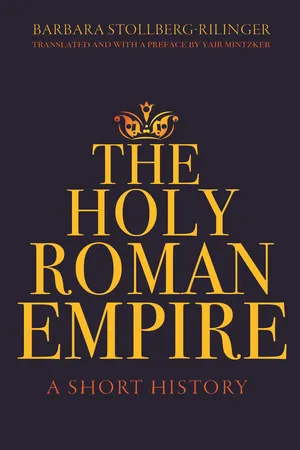
- 144 pages
- English
- PDF
- Available on iOS & Android
About this book
A new interpretation of the Holy Roman Empire that reveals why it was not a failed state as many historians believe
The Holy Roman Empire emerged in the Middle Ages as a loosely integrated union of German states and city-states under the supreme rule of an emperor. Around 1500, it took on a more formal structure with the establishment of powerful institutions—such as the Reichstag and Imperial Chamber Court—that would endure more or less intact until the empire's dissolution by Napoleon in 1806. Barbara Stollberg-Rilinger provides a concise history of the Holy Roman Empire, presenting an entirely new interpretation of the empire's political culture and remarkably durable institutions.
Rather than comparing the empire to modern states or associations like the European Union, Stollberg-Rilinger shows how it was a political body unlike any other—it had no standing army, no clear boundaries, no general taxation or bureaucracy. She describes a heterogeneous association based on tradition and shared purpose, bound together by personal loyalty and reciprocity, and constantly reenacted by solemn rituals. In a narrative spanning three turbulent centuries, she takes readers from the reform era at the dawn of the sixteenth century to the crisis of the Reformation, from the consolidation of the Peace of Augsburg to the destructive fury of the Thirty Years' War, from the conflict between Austria and Prussia to the empire's downfall in the age of the French Revolution.
Authoritative and accessible, The Holy Roman Empire is an incomparable introduction to this momentous period in the history of Europe.
Frequently asked questions
- Essential is ideal for learners and professionals who enjoy exploring a wide range of subjects. Access the Essential Library with 800,000+ trusted titles and best-sellers across business, personal growth, and the humanities. Includes unlimited reading time and Standard Read Aloud voice.
- Complete: Perfect for advanced learners and researchers needing full, unrestricted access. Unlock 1.4M+ books across hundreds of subjects, including academic and specialized titles. The Complete Plan also includes advanced features like Premium Read Aloud and Research Assistant.
Please note we cannot support devices running on iOS 13 and Android 7 or earlier. Learn more about using the app.
Information

Table of contents
- Cover Page
- Title Page
- Copyright Page
- Contents
- Translator’s Preface to the English Edition
- A Note on the Translation
- Introduction
- 1. What Was the Holy Roman Empire of the German Nation?
- 2. A Body Made of Head and Limbs
- 3. Institutional Consolidation, 1495–1521
- 4. The Challenge of the Reformation, 1521–1555
- 5. From the Consolidation to the Crisis of the Imperial Institutions, 1555–1618
- 6. The Thirty Years’ War and the Peace of Westphalia
- 7. The Westphalian Order and the Renewed Rise of the Emperor
- 8. Political Polarization, 1740–1790
- 9. The Dissolution of the Empire, 1790–1806
- 10. Once Again: What Was the Holy Roman Empire?
- The Roman-German Emperors of the Early Modern Period
- Select Bibliography
- Index